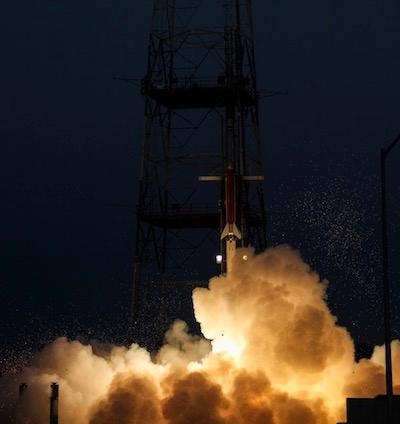Sat, Aug 18, 2018
About 100 Students Witness Suborbital Sounding Rocket Launch
Approximately 100 undergraduate university and community college students from across the United States were on hand to witness the launch of their experiments and technology demonstration projects on a NASA suborbital rocket at 6:13 a.m., Aug. 14, from NASA’s Wallops Flight Facility.

The Terrier-Improved Malemute sounding rocket launched as the sun was rising over the horizon and carried the student projects to an altitude of 98.5 miles.
After a brief ride into space, the payload carrying the students’ projects descended by parachute and landed in the Atlantic Ocean approximately 64 miles from the launch site. After recovery, the experiments will be returned to the students later in the day.
The eight experiments developed by students from across the country flew through the RockSat-X program in conjunction with the Colorado Space Grant Consortium. RockSat-X is the most advanced of NASA’s three-phase sounding rocket program for students. The RockOn launches are at the entry level, then progress to the intermedia level RockSat-C missions and then RockSat-X.
Also joining the RockSat-X students for the launch were about 50 students participating in the RockSat-XN program who are at Wallops preparing their experiment projects for flight. Similar to RockSat-X, XN includes experiments developed by students in the United States and those from universities in Norway and Japan.
XN is launching in January 2019 from the Andoya Space Center in Norway as part of an international project called the Grand Challenge Initiative (GCI) – Cusp.
In the GCI, NASA and United States scientists will join those from Norway, Japan, Canada and other countries during the next two years to investigate the region called the geomagnetic cusp — one of the few places on Earth with easy access to the electrically charged solar wind that pervades the solar system. The coordinated studies of near-Earth space at the Polar Regions will help understand the fundamental processes of our neighborhood in space; such knowledge is needed for safe navigation and communication near the poles, where solar activity can disrupt radio signals.
(Image provided with NASA news release)
More News
Also: Vertical Flight Society, NBAA Maintenance Conference, GA Honored, AMT Scholarship For the first time, students from Embry-Riddle’s Daytona Beach, Florida, campus took t>[...]
Hazardous Weather Information Summary of significant meteorological information (SIGMET/WS), convective significant meteorological information (convective SIGMET/WST), urgent pilot>[...]
"The need for innovation at speed and scale is greater than ever. The X-62A VISTA is a crucial platform in our efforts to develop, test and integrate AI, as well as to establish AI>[...]
(FAA) Inspector Observed That Both Fuel Tanks Were Intact And That Only A Minimal Amount Of Fuel Remained In Each Analysis: According to the pilot, approximately 8 miles from the d>[...]
“Pyka’s Pelican Cargo is unlike any other UAS solution on the market for contested logistics. We assessed a number of leading capabilities and concluded that the Pelica>[...]
 Airborne-Flight Training 05.09.24: ERAU at AIAA, LIFT Diamond Buy, Epic A&P
Airborne-Flight Training 05.09.24: ERAU at AIAA, LIFT Diamond Buy, Epic A&P ANN's Daily Aero-Term (05.07.24): Hazardous Weather Information
ANN's Daily Aero-Term (05.07.24): Hazardous Weather Information Aero-News: Quote of the Day (05.07.24)
Aero-News: Quote of the Day (05.07.24) NTSB Final Report: Cessna 150
NTSB Final Report: Cessna 150 Aero-News: Quote of the Day (05.08.24)
Aero-News: Quote of the Day (05.08.24)



